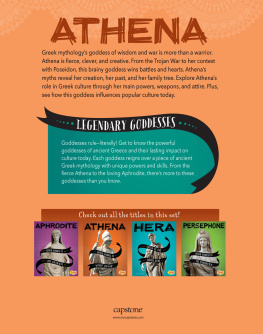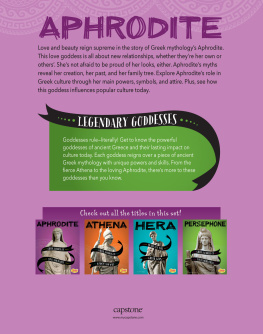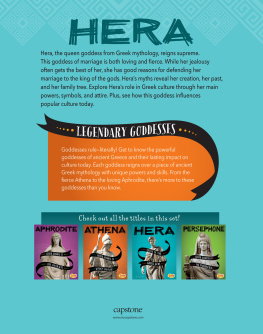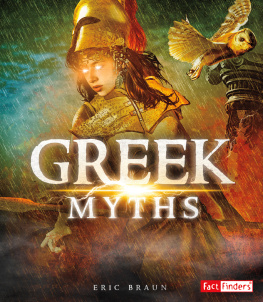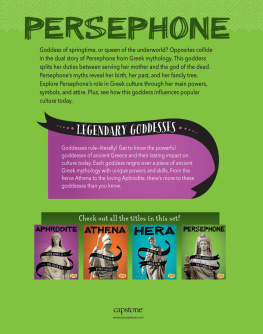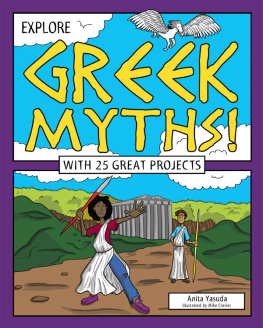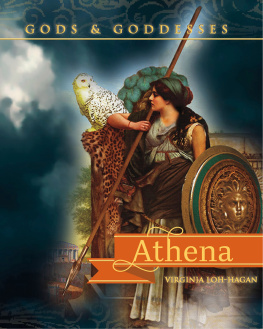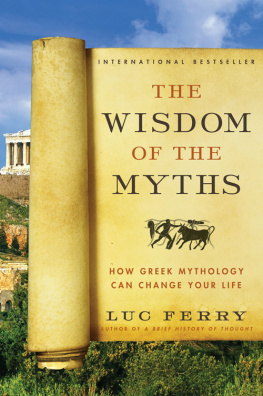Athena takes to the battlefield.
Athena is best known as a goddess of war. During the Trojan War, she fought for the Greeks against the people of Troy. In one version of the myth, she helped the Greeks win their victory with her skills.
But though she had a strong sense of justice, she took on the Greeks for mainly personal reasons. She was angry after losing a contest judged by woman on Earth. For Paris, this woman was Helen, wife to the king of Sparta. With Aphrodites help, Paris stole Helen away. Angry with Aphrodite, Athena fought with the Greeks as they attacked Troy to bring Helen back. The goddess gave them courage. She swooped onto the battlefield, her armor flashing with lightning and the snakes on her shield breathing fire. Still, the city of Troy held strong.
When a Trojans would come out, thinking there was no more danger. Athenas plan was working until a Trojan priest figured out their trick. He wanted to have the horse destroyed, but Athena sent sea-serpents to kill him. Her plan continued. The Trojans brought the horse into their city. At night, all the Greeks returned. The soldiers inside the horse snuck out and let their army into Troy. The city fell to the Greeks, and Athena had her victory.
Goddess Fact
A war took place in the area of Troy sometime between 1250 BC and 1180 BC. This historical war has been linked to the Trojan War of the myths.
In ancient Greek myths, Athena is one of the Twelve Olympians, the most powerful gods and goddesses of ancient Greece. The myths are stories created for different kinds of purposes, such as teaching lessons or explaining events that happened in the natural world. In these stories, Athena generally favors brains over brawn. Athena is also the goddess of wisdom. In wars she taps into her wisdom to help her side win, as she did in the Trojan War.
While she has many positive traits and special powers, Athena is flawed in ways that make her seem almost human. She has been known to act out in jealousy and anger. In one myth, Athena was furious when . While Tiresias could no longer see the world around him, he could now see into the future.
Athena was also known in ancient Greece for her inventions. She invented tools including the rake, plow, and yoke to help farmers. She invented the flute, too, bringing a new style of music to the people of Greece. She didnt play the flute, herself, however. Legend has it she tried the instrument but gave it up. She didnt like the way her cheeks puffed out while playing it.
Smart, powerful, understanding, and helpful, Athena earned respect among both gods and mortals of ancient Greece.
Goddess Fact
One version of Athenas role in the Trojan War was told by a Greek poet named Quintus Smyrnaeus. He continued other well-known stories of the war in The Fall of Troy .
Athenas Opposite
Ares, the Greek god of war, was more interested in the brutal aspects of battle than Athena was. This made him unpopular among the people. He was not even well liked by his own parents.
Athena was considered superior to Ares. More civil and just rather than bloodthirsty, she had a better approach to war.
Chapter 2
HER FAMILY TREE
Only a mythical goddess can claim an origin story like Athenas. Some stories say she only had a father, Zeus. He was the king of all the Greek gods, or the .
Before Athena was born, Zeuss grandparents, Uranus and Gaia, told Zeus that Metis was going to give birth to a son who would grow up to dethrone him. Zeus did not want this to happen, of course. So one day he tricked Metis and swallowed her. After a time, Zeus developed a terrible headache. Athena was born from his head. She burst out of his forehead as a full-grown woman. She was even dressed in armor!
In one version of Athenas birth, the god Hephaistos strikes Zeuss head with his axe. Then Athena is born.
Did Zeus Really Marry His Own Sister?
The short answer is yes. But why? In Greek myths, it was common for Greek gods and goddesses to marry other family members. The gods were all relatives of Gaia, so marrying other gods often meant marrying siblings or other close family members. As part of myths, the gods did not have to follow the usual practices of humans.
Goddess Fact
Greek and Roman myths tell similar stories. But the Romans gave the gods and goddesses different names. In Roman mythology, Athena is known as Minerva.
Athenas father, Zeus, had many more children with both goddesses and mortals. In total, he had more than 30 children!
With so many siblings, Athena had a lot of competition for her fathers attention. But by all accounts, Athena was her fathers favorite. According to legend, he allowed her to use his weapons. That included his powerful thunderbolt, which he would throw like a spear to strike down his enemies.
Goddess Fact
Athena did not give birth to any children, but she raised Erichthonius, who was half-man and half-snake. He became a king.
Athenas Twelve Olympians.
The 12 Olympians
ZEUS - king of the gods and god of the sky
APHRODITE - goddess of love and beauty
APOLLO - god of music
ARES - god of war
ARTEMIS - goddess of hunting
ATHENA - goddess of wisdom and war
DEMETER - goddess of agriculture
DIONYSUS - god of wine
HEPHAISTOS - god of fire and the
HERA - queen of the gods and goddess of marriage
HERMES - messenger and god of trade
POSEIDON - god of the sea
*Hestia was sometimes considered one of the Twelve Olympians before Dionysus.

